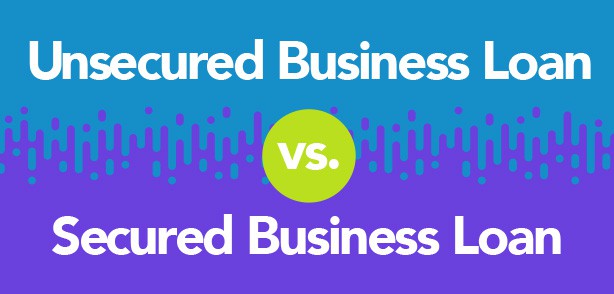Secured vs. Unsecured Business Loans: How to Select a Loan

Suppose your small business needs more cash than can be supplied through a line of credit or personal credit cards. In that case, it may be necessary to apply for a small business loan.
As with any form of financing, debt structure and payment schedule will depend on the bank, your credit history, and your relationship with the lender. Due to these factors and many others, you might not be able to receive a loan amount unless it’s secured.
Before applying for business funding, we suggest determining whether you’ll need to pursue a secured or unsecured loan. This post will help you decide which financing option is the right fit for your company.
Secured vs. Unsecured Loans: How Are They Different?
Secured Loan Definition:
Secured business loans are the most common and straightforward lending option because they’re backed by a business or personal assets, such as equipment or real estate.
If the borrower defaults, the business lender assumes ownership of the property and may try to recoup their loss by selling it. Below, you’ll find the types of collateral that could be used to secure a loan:
Personal Cash
Unpaid Invoices
Inventory
Equipment
Real Estate
As a small business owner, you may benefit from this option if you want to limit your personal risk in the investment. Or, maybe you want lower interest rates and the ability to pay back the investment over a longer period.
To further explain the intricacies of secured loans, we’ll review the pros and cons of this loan option below.
The Pros of Secured Loans:
Typically, banks are willing to work with small businesses when their investment is somewhat assured.
Secured loans may allow you to pay back over time for large purchases that you don’t expect to pay off quickly (such as real estate). In fact, these loan terms can go up to 30 years. Also, since secured loans represent less risk for the lender, there may be some leeway if you miss a weekly or monthly payment.
The Cons of Secured Loans:
Secured loans are limited by the fair value of the asset pledged as collateral. A secured loan means you’re giving the business lender legal permission to seize the asset if you can’t make the agreed-upon payments on time.
It’s important to note that the lender can seize the asset without a court order. Due to this, it could put the future of your business in jeopardy, in addition to your personal finances.
Therefore, you should be careful when putting up collateral to secure any amount of money. If losing this collateral could cause significant financial damages to your livelihood (such as necessary equipment), you should reconsider this working capital option.
Unsecured Loan Definition:
The term ‘unsecured loan’ means that the borrower doesn’t have to provide collateral to qualify and receive financing.
Unsecured business loans may be viable for business owners with a strong personal credit score. However, this type of business financing represents more risk to the lender. If you borrow money and default on your payments, there is no asset to seize.
For this reason, unsecured loans typically come with stringent standards (such as credit score requirements) and higher interest rates. In addition, banks may require a different security feature as an alternative to collateral – like a percentage of your credit card transactions.
If you default on an unsecured loan, the bank may take the following actions:
Pursue legal action against you
Employ a collection agency
Some unsecured loans require a personal guarantee, which means the lender will be able to appropriate your assets if your business defaults on loan. This option is best for entrepreneurs who need large amounts of cash quickly and expect to pay it off in a short time.
The Pros of Unsecured Loans:
Unlike secured financing, unsecured business loans aren’t bound by the underlying asset’s value. Not having collateral can bypasses lengthy appraisal processes, which means you could get the cash you need sooner. If your business files for bankruptcy, unsecured loans have the potential to be forgiven.
The Cons of Unsecured Loans:
This business financing option is typically more expensive and often comes with short repayment periods. Because of these reasons, it’s also much harder to obtain.
When you apply for a secured loan, lenders will want to ensure that you meet the following requirements:
Your time in business has been several years.
Your company earns substantial revenues or positive cash flow
You have an excellent personal credit history.
To ensure you meet their credit requirement, we suggest running your credit report before applying for unsecured business financing.
Defaulting on unsecured business loans can mean financial ruin and damaged credit, so make sure you’re confident in your business before applying.
Conclusion: Understand the Differences Between Secured and Unsecured Loans
For new entrepreneurs, secured business loans may be the only available option. Unsecured credit can offer more flexibility, larger amounts, and faster access to cash for established business owners willing to pay higher interest rates. However, they may be held personally accountable if the business defaults.
Entrepreneurs may also want to consider partially secured loans, where the collateral is required but doesn’t have to cover the principle. Lenders assume less risk with these loans because they typically aren’t discharged by bankruptcy. Therefore, the pledged asset guarantees some return in the event of default. Banks may offer more attractive terms for partially secured loans than unsecured, such as lower interest rates and longer repayment time.
Editor’s Note: This post was updated for accuracy and comprehensiveness in June 2022.
